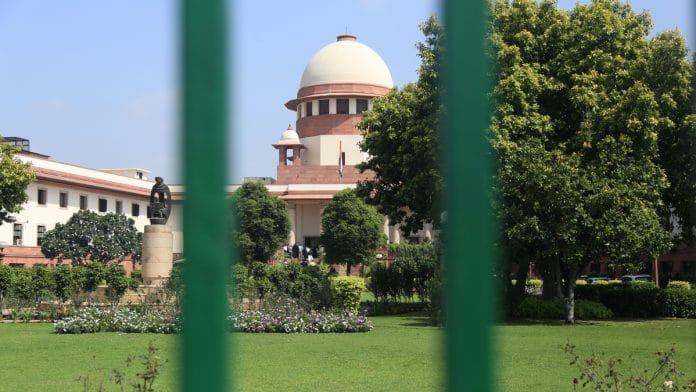New Delhi: Contributions to a Supreme Court agency funding legal aid have gone up 10-fold within a year, with judicial penalties for frivolous petitions, contempt, and tardiness on the part of parties/lawyers bringing in Rs 9 crore in 2018-19.
An RTI application filed by ThePrint with the top court has revealed that the Supreme Court Legal Services Authority (SCLSA) received Rs 95 lakh of the penalties imposed by judges in 2017-18. This figure rose to Rs 9.24 crore in 2018-19, accounting for roughly 80.5 per cent of the Rs 11.48 crore received since 2014-15.
“The same has been deposited in Fixed Deposit Receipts for utilisation of legal aid,” the Supreme Court said in the RTI reply.
Over the years, the Supreme Court and high courts have been imposing financial penalties on litigants and advocates in order to deter them from filing frivolous petitions, or for contempt of court. This is apart from the fines handed out as part of the judgments against them.
Most often, the money fined has to be deposited where judges overseeing a certain case see fit.
The SCLSA, which arranges free legal aid for those who don’t have any, is just one beneficiary, with others including the Supreme Court Bar Association (SCBA), the National Legal Service Authority (NALSA), and the Supreme Court Advocates on Record Association (SCAORA).
The SCLSA is the only one of these bodies that falls under the Supreme Court, which is why the RTI query to the court yielded details of the contributions to this agency alone.
Speaking to ThePrint, Anuj Bhuwania, author of the book Courting the People: Public Interest Litigation in Post-Emergency India and associate professor at Ambedkar University, said while fines for non-compliance of orders and tardiness were important, the same couldn’t be said of frivolous petitions, which have been under the top court’s lens for a while now.
“While there is definitely a problem with the PIL jurisdiction, such a glut of ‘frivolous’ PILs is mostly the Supreme Court’s own doing due its refusal to come up with, and then actually apply, any meaningful rules regulating the PIL jurisdiction,” he said.
“In any case, ‘frivolity’ is far too subjective a criterion and what may be frivolous for one judge may be perfectly serious for another,” he added. “The practice of imposing costs in such cases is therefore far too random.”
The reasons they were fined
Of the over Rs 11 crore deposited with the SCLSA since 2014, Rs 3 crore came from one case alone. Here, ThePrint presents different examples of penalties imposed by the court on parties it held errant.
For contempt
In February, the top court held industrialist Anil Ambani and three of his firms, including Reliance Communications, guilty of contempt for not paying back their dues to Ericsson India despite the court’s orders — Ambani, Reliance Telecom chairman Satish Seth and Reliance Infratel chairperson Chhaya Virani were subsequently fined Rs 1 crore each.
The order was delivered by a two-judge bench comprising Justices Rohinton Nariman and Vineet Saran.
Erring states and officials
In November 2018, hearing a matter pertaining to vacancies in state forensic science laboratories, and their impact on the criminal justice system, a bench led by Justice Madan B. Lokur (since retired), Justice S. Abdul Nazeer and Justice Deepak Gupta fined several states Rs 50,000 each for not furnishing information sought by the Centre.
The union government had asked states such as Rajasthan (vacancies about 50 per cent), Goa (vacancies about 60 per cent), Assam (40 per cent), Karnataka (more than 50 per cent), Maharashtra (more than 50 per cent), Odisha (33 per cent), Uttar Pradesh (80 per cent), for information on filling up the vacancies but they didn’t comply.
The income tax department was fined Rs 10 lakh in August 2018, by a bench of Justices Madan B. Lokur, S. Abdul Nazeer and Deepak Gupta, after the commissioner of income tax (CIT), Ghaziabad, reportedly attempted to present “false and misleading” facts.
Also read: Indian courts need MBAs and not Chief Justice to deal with pendency
Fined for filing frivolous pleas
Over the years, frivolous PILs have come under the scanner for exacerbating the judiciary’s towering backlog, and several lawyers have consequently been fined by the top court.
In 2017, Chief Justice of India J.S. Khehar decreed that frivolous petitions would attract a fine of Rs 5 lakh, saying it would “view with disfavour any attempt by a litigant to abuse the process (of law)”.
“Exemplary costs are inevitable, and even necessary, in order to ensure that in litigation, as in the law which is practised in our country, there is no premium on the truth,” the bench said.
“A litigant who takes liberties with the truth or with the procedures of the Court should be left in no doubt about the consequences to follow.”
In December last year, the top court dismissed a plea filed by advocate M.L. Sharma, who has earned something of a reputation for poorly-drafted petitions.
Sharma had filed a plea accusing Union Finance Minister Arun Jaitley of attempting to tap the reserves of the Reserve Bank of India to waive the debt of big corporate houses. The top court threw out the petition and fined Sharma Rs 50,000, directing the court registry to not accept any PIL from him till he deposited the fine.
On 22 October 2018, the top court dismissed a plea filed by advocate Asok Pande, who sought to lower the marriageable age of men from 21 years to 18 years, and fined him Rs 25,000.
In April 2018, a bench comprising Justice Madan B. Lokur and Justice Deepak Gupta had also fined the Centre Rs 1 Lakh while dismissing a plea as “frivolous”: The Centre had filed an appeal against a retired soldier, despite the fact that pleas of a similar nature had been dismissed by the court earlier.






